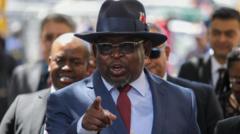South Africa is presently navigating a tumultuous political landscape, with profound divisions in its coalition government emerging over the national budget recently unveiled after a prolonged delay. Analysts characterize this period as ‘uncharted waters’ following Finance Minister Enoch Godongwana’s controversial budget proposal, which has faced staunch resistance from key coalition partners for a second time.
The African National Congress (ANC), having forged a coalition with nine other parties after losing its parliamentary majority in last year’s elections, finds itself in a precarious position. The proposed budget, initially delayed due to pushback against a substantial hike in value-added tax (VAT), has elicited further backlash from the Democratic Alliance (DA), the ANC’s largest coalition partner. Without the DA's support, the ANC struggles to pass the budget unless it modifies its contentious policies or seeks approval from significant opposition parties.
After intense discussions among coalition members, Godongwana returned with a "bold and pragmatic" approach, presenting a revised budget that proposes a VAT increase, albeit more modest than originally suggested, from 15% to 16% over two years. The Finance Minister argues that raising taxes is crucial for addressing ongoing demand in sectors including health, education, transport, and security. However, he faces criticism for choosing VAT over potential increases in personal or corporate taxes, which critics assert would mitigate the financial strain on the poorest communities.
While the ANC endorses this adjusted budget, the DA remains opposed, insisting on temporary tax increases accompanied by significant economic reforms to foster job growth and efficiency within three years. The ongoing discord raises questions about President Cyril Ramaphosa’s negotiating prowess, as the coalition's fabric unravels under pressure.
Complicating matters further, the DA is also contesting new land reform legislation that enables government seizure of private property under certain circumstances, stoking further tensions with widely differing views on property rights in South Africa.
Political analysts emphasize the critical role of parliament in determining the fate of this budget; it can either amend, accept, or reject it altogether. The dynamic appears increasingly precarious for the ANC, traditionally able to advance its policies with relative ease, now compelled to collaborate with opposition factions or face the potential downfall of the coalition government.
The public is wary as Minister Godongwana now stands at a crossroads in his reputation, tasked with navigating the complex legislative process to ensure the budget's survival. As tensions rise, calls for more equitable taxation strategies, such as a proposed wealth tax on affluent populations, echo amid mounting socioeconomic challenges in a nation grappling with one of the highest unemployment rates globally.
As South Africa confronts these financial and political challenges, the international community watches closely, understanding that stability within its coalition government could have significant ramifications for the country’s future.



















